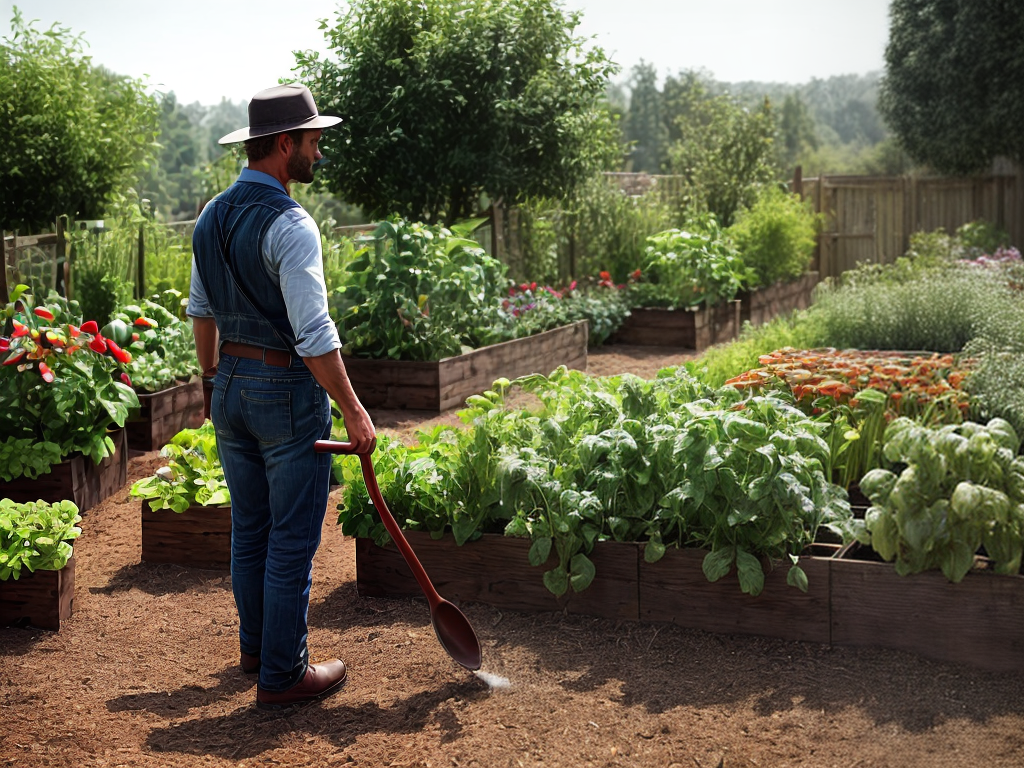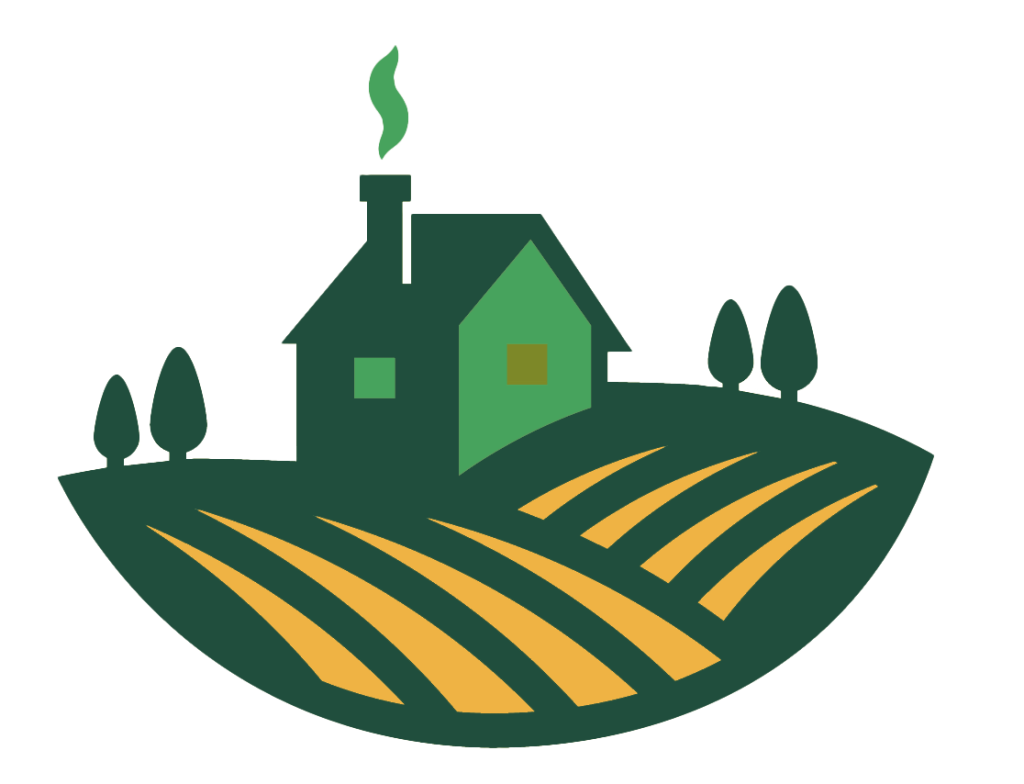
Did you know that up to 70% of household water usage goes towards outdoor irrigation? If you’re looking to conserve water and keep your organic veggie garden thriving, then you’re in the right place. In this article, I’ll share efficient watering methods that will help you save water, time, and effort. From using drip irrigation and mulching to watering at the base of plants and monitoring soil moisture levels, these tips will ensure your garden stays healthy and sustainable.
Drip Irrigation
I prefer using drip irrigation in my organic veggie garden. Drip irrigation offers numerous benefits for efficient watering. It delivers water directly to the plant roots, minimizing evaporation and water waste. This method also ensures that water reaches the plants’ root zones, promoting healthier and more robust growth. Drip irrigation installation is relatively simple and can be done by homeowners. It involves laying out a network of tubes with strategically placed emitters. These emitters release water slowly and evenly, providing consistent hydration to each plant. Drip irrigation also allows for precise control over water distribution, preventing overwatering and reducing the risk of fungal diseases. Overall, drip irrigation is an excellent choice for those looking to optimize water usage and maintain a thriving organic veggie garden.
Mulching
Continuing from the previous subtopic of drip irrigation, a beneficial method to further enhance water efficiency in my organic veggie garden is by mulching. Mulching offers several benefits that contribute to the overall health and productivity of my plants. Firstly, it helps to retain moisture in the soil by reducing evaporation, which means less frequent watering is needed. Additionally, mulch acts as a barrier, preventing weed growth and reducing the competition for water and nutrients. It also helps to regulate soil temperature, keeping it cooler in the summer and warmer in the winter. When it comes to mulching techniques, I choose organic materials such as straw, grass clippings, or shredded leaves, which decompose over time and enrich the soil. I apply a layer of mulch around my plants, making sure to leave a small gap around the stems to prevent rot.
Watering in the Morning
When it comes to watering your organic veggie garden, watering in the morning offers several benefits. Firstly, it allows the plants to absorb the water and nutrients they need before the heat of the day sets in. Secondly, morning watering helps to minimize the risk of fungal diseases as the foliage has time to dry before nightfall. So, make it a habit to water your garden in the morning for optimal results.
Benefits of Morning Watering
Watering your organic veggie garden in the morning offers numerous advantages. Here’s why you should consider this watering technique:
-
Improved nutrient absorption: Morning watering allows your plants to efficiently absorb the water and nutrients they need to thrive. The cooler temperatures and lower humidity in the morning help prevent evaporation, ensuring that your plants can make the most of the water provided.
-
Reduced risk of disease: Watering in the morning allows the foliage to dry out during the day, reducing the risk of fungal diseases that thrive in damp conditions. This is especially important for container gardens, where proper drainage is crucial to prevent waterlogged roots.
-
Increased water efficiency: By watering in the morning, you can take advantage of the cooler temperatures and lower wind speeds, which means less water is lost to evaporation. This helps conserve water and saves you money on your water bill.
-
Stronger plants: Morning watering helps plants establish deep root systems, making them more resilient to drought and providing better overall plant health.
Best Time to Water
By adopting the practice of watering in the morning, I have noticed significant improvements in the health and productivity of my organic veggie garden. Watering in the morning is one of the best watering techniques for your garden. The key reason for this is the importance of soil moisture. Watering in the morning allows the soil to absorb the water properly before the heat of the day sets in. This ensures that the plants have access to the necessary moisture throughout the day, promoting healthy growth and minimizing the risk of wilting. Additionally, watering in the morning helps to prevent the growth of fungal diseases, as the foliage has time to dry before nightfall. Overall, watering in the morning is a simple and effective way to keep your organic veggie garden thriving.
Watering Deeply and Infrequently
I water my organic veggie garden deeply and infrequently to promote healthy root growth. Here’s why this method works:
-
Watering frequency: Instead of watering every day, I water deeply once or twice a week. This allows the water to penetrate deep into the soil, encouraging the roots to grow deeper in search of moisture.
-
Stronger roots: Deep watering encourages the roots to grow deeper, making them more resilient to drought and better able to absorb nutrients from the soil.
-
Preventing shallow watering: Shallow watering, where the water only reaches the surface, can lead to shallow root growth and weak plants. By watering deeply, I ensure that the roots are encouraged to grow deeper into the soil.
-
Water conservation: By watering infrequently, I conserve water and reduce the risk of overwatering, which can lead to root rot and other plant diseases.
Using Rainwater Harvesting
To efficiently utilize water resources in my organic veggie garden, I rely on rainwater harvesting. Rainwater collection is a simple and effective way to conserve water and reduce our reliance on municipal sources. By installing a rain barrel or a rainwater harvesting system, I am able to capture and store rainwater for later use in my garden. This not only saves me money on water bills but also helps to reduce the strain on local water supplies.
Here is a table highlighting the benefits of rainwater harvesting:
| Benefits of Rainwater Harvesting |
|---|
| Reduces water bills |
| Decreases reliance on municipal water |
| Conserves local water resources |
| Reduces stormwater runoff |
| Provides natural, chemical-free water for plants |
Rainwater harvesting is a practical and sustainable solution for watering my organic veggie garden. By collecting rainwater, I am able to minimize water waste and contribute to a greener environment.
Installing a Timer System
When it comes to efficiently watering my organic veggie garden, one method that has proven to be effective is installing a timer system. Not only does this system help me save time and effort, but it also promotes water conservation and reduces water waste. Here are four reasons why installing a timer system is a smart choice for your garden:
-
Consistent watering: With a timer system, you can set specific watering schedules, ensuring that your plants receive the right amount of water consistently. This helps prevent under or overwatering.
-
Efficient use of water: By automating the watering process, you eliminate the risk of forgetting to turn off the sprinklers or leaving them on for too long. This reduces water waste and promotes eco-friendly practices.
-
Flexibility and convenience: A timer system allows you to water your garden even when you’re not home. You can set the timer to water during the early morning or late evening when evaporation rates are lower, maximizing water absorption by the plants.
-
Customization options: Depending on your garden’s needs, you can adjust the timer settings to water different areas for varying durations. This ensures that each plant receives the right amount of water, promoting healthy growth.
Using Soaker Hoses
A convenient way to efficiently water my organic veggie garden is by using soaker hoses. Soaker hoses are a type of irrigation system that deliver water directly to the roots of plants, reducing water waste and promoting healthier growth. One of the advantages of using soaker hoses is their low maintenance requirements. To ensure proper functioning, it is important to regularly inspect the hoses for any leaks or blockages. If any issues are found, they can be easily fixed by using hose repair kits or by replacing damaged sections. Additionally, soaker hoses are flexible and can be easily adjusted to fit the layout of your garden. By using soaker hoses, you can save time, water, and effort while still providing your organic veggies with the hydration they need.
Watering at the Base of Plants
I prefer watering at the base of plants in my organic veggie garden because it allows for direct hydration and minimizes water waste. When watering at the base of plants, the water goes directly to the roots, providing them with the essential moisture they need for growth and development. Here are four reasons why this watering technique is beneficial:
-
Efficient water absorption: Watering at the base of plants ensures that the water is being absorbed directly by the roots, maximizing its effectiveness and reducing the risk of evaporation.
-
Prevents leaf diseases: By avoiding overhead watering, you minimize the chances of water splashing onto the leaves, which can promote the growth of fungal diseases.
-
Conserves water: Watering at the base of plants reduces water waste by delivering water directly to where it is needed, minimizing runoff and evaporation.
-
Promotes root zone hydration: Focusing on the root zone ensures that the roots receive adequate moisture, leading to healthier and more vigorous plants.
Grouping Plants With Similar Water Needs
When it comes to efficient watering in your organic veggie garden, grouping plants with similar water needs is key. By organizing your plants based on their specific water requirements, you can avoid overwatering or underwatering certain plants, saving water and promoting healthier growth. Take the time to research and understand the water needs of each vegetable in your garden, and then group them accordingly for optimal watering efficiency.
Watering Efficiency Through Grouping
To maximize watering efficiency in my organic veggie garden, I group plants with similar water needs. This not only helps me save water but also ensures that each plant gets the right amount of moisture it requires. Here are four reasons why grouping plants with similar water needs is an efficient watering technique:
-
Water Conservation: By grouping plants with similar water needs together, I can avoid overwatering or underwatering certain plants. This helps me optimize water usage and reduce wastage.
-
Time-Saving: Grouping plants with similar water needs allows me to water them all at once, saving time and effort. I can easily adjust the watering schedule based on the needs of each group, making the process more efficient.
-
Improved Plant Health: Plants that receive the right amount of water are healthier and more resistant to diseases. By grouping plants with similar water needs, I can ensure their optimal growth and overall well-being.
-
Easy Maintenance: When plants are grouped based on their water requirements, it becomes easier to monitor and maintain their health. I can easily identify any issues or changes in watering needs and address them promptly.
Plant-Specific Water Requirements
By considering the plant-specific water requirements and grouping plants with similar needs, I can efficiently water my organic veggie garden. Different types of plants have varying water needs, so it is essential to understand their specific requirements. Some plants, like tomatoes and cucumbers, need consistent moisture, while others, like herbs and root vegetables, require less frequent watering. To save water and ensure optimal growth, I can implement plant-specific irrigation techniques. For example, using drip irrigation for water-loving plants and hand-watering for those that prefer drier conditions. Additionally, mulching around plants can help retain moisture in the soil and reduce evaporation. By grouping plants with similar water needs, I can create efficient watering zones and avoid overwatering or underwatering certain plants.
Monitoring Soil Moisture Levels
Using a moisture meter is an effective way to monitor soil moisture levels in my organic veggie garden. It helps me ensure that my plants are getting the right amount of water and prevents under or over watering. Here are four reasons why measuring moisture levels is crucial for the success of my garden:
-
Precision: By knowing the exact moisture levels in the soil, I can provide water to my plants with precision, giving them the optimal conditions for growth.
-
Water conservation: Monitoring moisture levels helps prevent water wastage by avoiding unnecessary watering. This not only saves water but also reduces water bills.
-
Plant health: Overwatering can lead to root rot and other diseases, while underwatering can cause stress and stunted growth. Measuring moisture levels helps maintain the ideal balance for healthy plants.
-
Automated watering systems: With a moisture meter, I can easily integrate automated watering systems that adjust water supply based on the moisture levels, making watering my garden more efficient and convenient.


